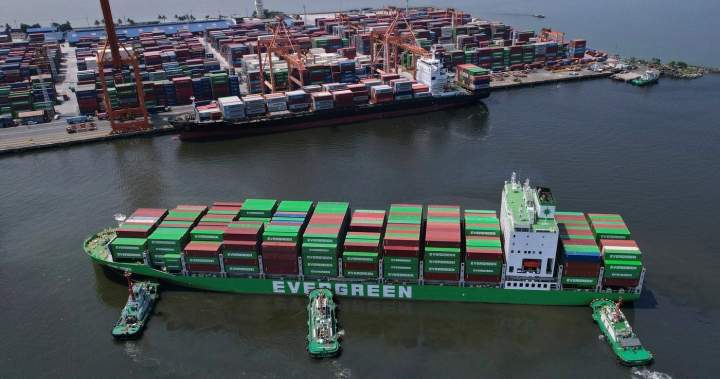The U.S. succeeded in blocking a global fee on shipping emissions as an international maritime meeting adjourned Friday without adopting regulations.
The world’s largest maritime nations had been deliberating on adopting regulations to move the shipping industry away from fossil fuels to slash emissions. But U.S. President Donald Trump, Saudi Arabia and other countries vowed to fight any global tax on shipping emissions.
The U.S. had threatened to retaliate if nations support it. Trump urged countries to vote “No” at the International Maritime Organization headquarters in London, posting on his social media platform Truth Social on Thursday that “the United States will not stand for this global green new scam tax on shipping.”
In a post on X Friday, U.S. Secretary of State Marco Rubio called the plan’s failure “another HUGE win” for Trump, who has called efforts to combat climate change and adopt green technology a “con job” as recently as this year’s United Nations General Assembly.
Rubio had decried the regulations as a “global carbon tax” and threatened sanctions, visa restrictions and other retaliatory measures against countries that supported it.
A spokesperson for Transport Canada told Global News on Thursday that the government was supportive of the regulations, but did not address concerns about potential U.S. retaliation amid Canada’s trade and security negotiations with the Trump administration.
“As a founding member of the International Maritime Organization, Canada is working with international partners to advance climate action in the international shipping sector,” spokesperson Hicham Ayoun said in a statement.
“The Government of Canada has and will continue to work closely with the United States on marine shipping.”
The U.S. State Department would not comment on whether Rubio or other officials has raised the issue with their Canadian counterparts.
More negotiations set for coming year
The IMO is the United Nations agency that regulates international shipping.
Saudi Arabia called for a vote to adjourn the meeting for a year. More than half of the countries agreed.
Get daily National news
Get the day’s top news, political, economic, and current affairs headlines, delivered to your inbox once a day.
“Now you have one year, you will continue to work on several aspects of these amendments,” Arsenio Dominguez, secretary general of the International Maritime Organization, said in his closing remarks. “You have one year to negotiate and talk and come to consensus.”
Ralph Regenvanu, minister for climate change for the Pacific Island nation of Vanuatu, said the decision is unacceptable, “given the urgency we face in light of accelerating climate change.”
If the green shipping regulations were adopted, it would have been the first time a global fee was imposed on planet-warming greenhouse gas emissions. Most ships today run on heavy fuel oil that releases carbon dioxide and other pollutants as it’s burned.
“The delay leaves the shipping sector drifting in uncertainty. But this week has also shown that there is a clear desire to clean up the shipping industry, even in the face of U.S. bullying,” said Alison Shaw, IMO Manager at Transport & Environment, a Brussels-based environmental nongovernmental organization.
Shipping emissions have grown over the past decade to about 3% of the global total as trade has grown and vessels use immense amounts of fossil fuels to transport cargo over long distances. In April, IMO member states agreed on the contents of the regulatory framework, with the aim of adopting the “Net-Zero Framework” at this London meeting.
Adopting the regulations was meant to demonstrate how effective multilateral cooperation can deliver real progress on global climate goals, said Emma Fenton, senior director for climate diplomacy at a U.K.-based climate change nonprofit, Opportunity Green. Delaying the process risks undermining the framework’s ambitions, they added.
The regulations would set a marine fuel standard that decreases, over time, the amount of greenhouse gas emissions allowed from using shipping fuels. The regulations also would establish a pricing system that would impose fees for every ton of greenhouse gases emitted by ships above allowable limits, in what is effectively the first global tax on greenhouse gas emissions.
The fees had been estimated to generate $11 billion to $13 billion in revenue annually if adopted. They were to go into an IMO fund to invest in fuels and technologies needed to transition to green shipping, reward low-emission ships and support developing countries so they aren’t left behind with dirty fuels and old ships.
The IMO, which regulates international shipping, set a target for the sector to reach net-zero greenhouse gas emissions by about 2050, and has committed to ensuring that fuels with zero or near-zero emissions are used more widely.
“What matters now is that countries rise up and come back to the IMO with a louder and more confident yes vote that cannot be silenced,” said Anaïs Rios, shipping policy officer for Seas At Risk. “The planet and the future of shipping does not have time to waste.”
—With additional files from Global News
© 2025 The Canadian Press
U.S. blocks plan to charge ‘carbon tax’ on global shipping emissions


